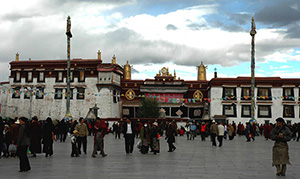
Photo: Jokhang Temple in Lhasa, Tibet
Recent legislation passed by China in the Tibetan Autonomous Region (TAR) forces Tibetans to spy on each other and foreigners in the name of national security, reports the International Campaign for Tibet (ICT). According to their report, the Chinese “Regulations on counter-espionage Security of the Tibet Autonomous Region”, which came into force on January 1, the new regional-levels regulations are in accordance with, among others, the national Counter-espionage Law of the People’s Republic of China (2014).
Tibetans have been encouraged to spy on fellow Tibetans for decades, but this goes further, the report says that the Communist Party is openly using “coercion and silencing to maintain political control” and in addition to reporting on fellow Tibetans, people are now to report on foreigners’ activities. Rewards in the form of access to government jobs or “safety from harassment by law enforcement officers” are offered – demonstrating the pressure ordinary Tibetans face from their local law enforcement officers.
ICT’s report mentions increasing pressure on Tibetans and the widespread use of surveillance technologies. If cameras and facial recognition algorithms pick up activity deemed suspicious, those who witnessed it, yet failed to report it, also fall under suspicion, and may face interrogation at length. People under official notice for past “bad behaviour” are especially vulnerable as a condition of release from detention is to report on their neighbours or face a return to prison. As everyone knows this is standard practice, they tend to steer clear of those targeted by this unrelenting pressure to report, leading to ostracisation within their own community while remaining under intense pressure to deliver counter-intelligence. In the past, people would flee abroad but this option is now almost impossible.
Another aspect is that since TAR regions border many Asian countries, the Chinese authorities use Tibetans living in those regions as “civilian frontline of defences”.
The regional “counter-espionage regulations”, for the provinces in TAR reflect China’s biased policies for Tibetans compared to the regulations for other Chinese provinces. ICT’s report mentions that “counter-espionage” in the TAR includes activities such as “ethnic secession,” “ethnic dispute” and “using religion to endanger national security”.

Wang Tiancheng
Photo: Photo: University of Pennsylvania Carey Law School
Speaking to ICT, the former law lecturer at Peking University and Chinese legal activist Wang Tiancheng, explained the definition of “espionage” saying “ [T]he Counter-espionage Law gives security authorities arbitrary powers to handle all kinds of activities which they perceive as endangering national security including espionage. Their exercise of powers, including wiretapping, opening investigations, making detentions and arrests, and carrying out pre-trials, is not subject to judicial review. […]”
Wang Tiancheng says that the Chinese government uses charges of endangering national security to cover up the persecutions of human rights and pro-democracy activities.
“With Tibet Autonomous Region’s introduction of the implementing regulations of the Counter-Espionage Law, it is more likely than before that a person will be charged of conducting espionage or other crimes of endangering national security if he or she collects local information about human rights abuses and passes the information to organisations outside of China. It is also more likely than before that a foreign visitor to Tibet will be charged of conducting espionage or endangering China’s national security if he or she is interested in collecting information about human rights situations or meeting with sensitive persons,” he said.




 Print
Print Email
Email